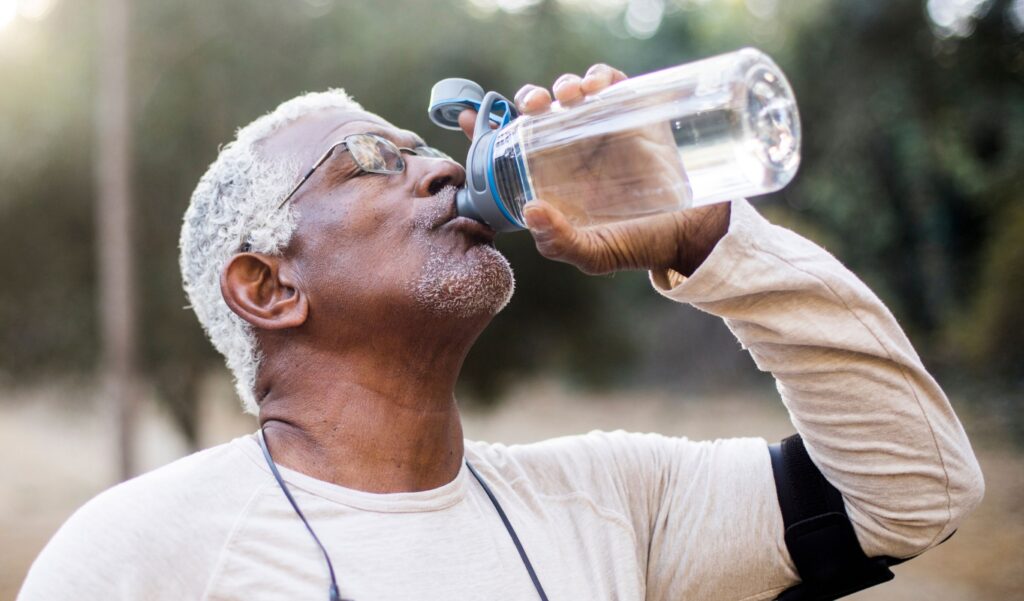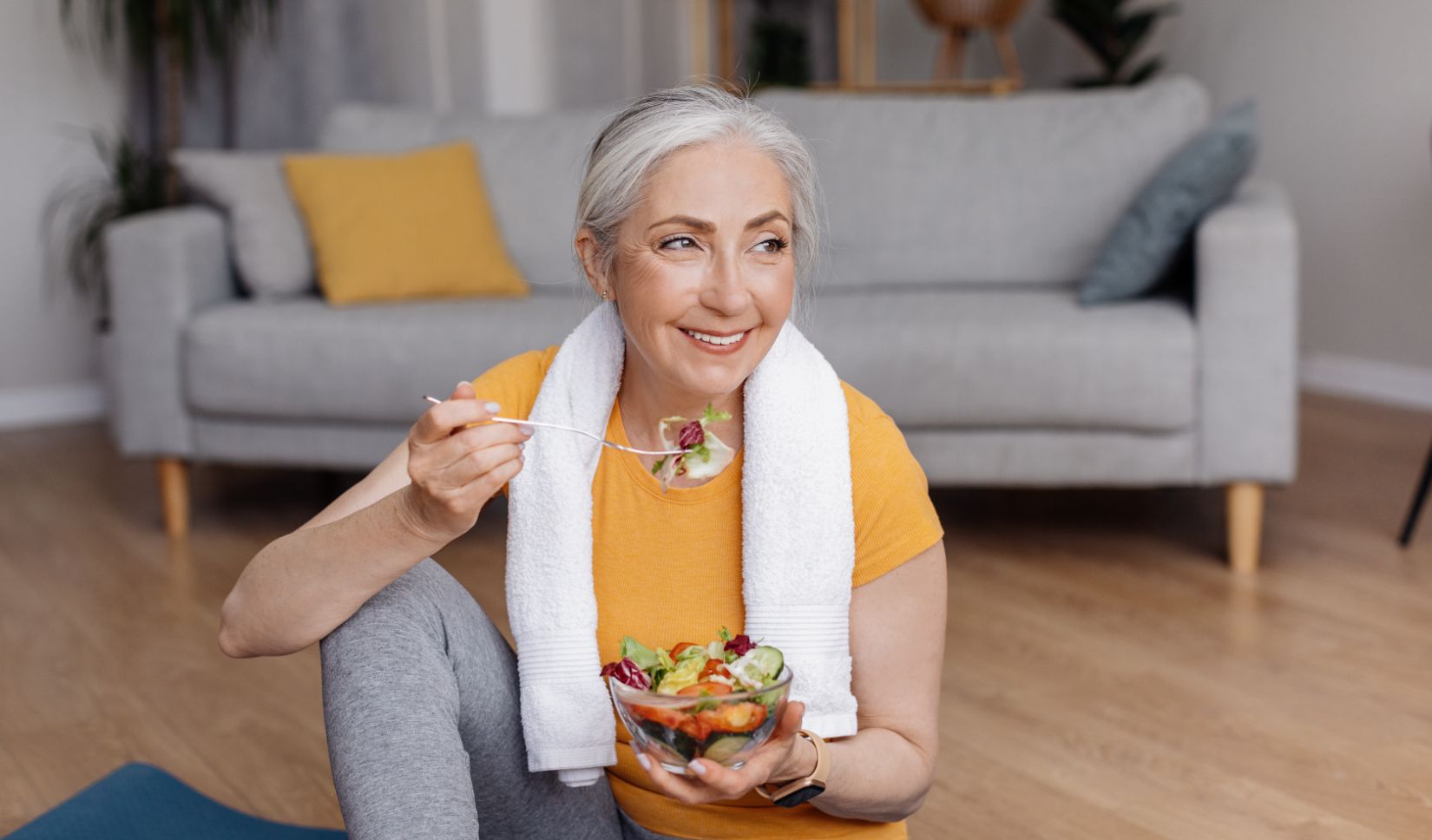The importance of hydration for older adults and those with certain chronic health conditions cannot be overstated. With warmer weather comes more outdoor activities—whether strolling the neighborhood, walking the dog, or enjoying some light gardening. That brings more chances for dehydration in seniors when spending more time out in the warm sun and losing body fluid to perspiration.
Drinking enough water regulates body temperature, improves circulation, lubricates joints, delivers nutrients to cells throughout the body, helps prevent infections, and helps maintain proper organ function. Good hydration in older adults also improves the quality of our sleep, mood, and cognition.
How much water is required for good hydration in older adults?
We’ve all heard that drinking eight glasses of eight ounces each every day—equivalent to two quarts—is a good recipe for proper hydration among older adults. Some experts recommend raising that to 11 cups and 16 cups daily for men and women respectively, with some extra water coming from coffee or tea, or foods with high water content such as cucumbers, strawberries, celery, melon, grapefruit and oranges, lettuce, cabbage and spinach, and grapes. Low-sodium soups, broths, and stews are also good sources of water as are skim milk and nut milks.
If your members are spending a lot of active time outdoors, it is advised that they increase their water intake before and after an activity. It doesn’t take much time to lose enough body fluid to start feeling the effects of dehydration in seniors. And one need not feel thirsty to be dehydrated.
To get the most benefit out of the liquid one drinks, it’s best that your members avoid sugar-sweetened beverages such as soda or fruit juice, or sugary vitamin waters and energy drinks. High consumption of sugary drinks has been found to lead to weight gain, dental problems, and an increased risk of developing many dangerous health conditions such as type 2 diabetes, heart disease, stroke, kidney disease, obesity-related cancers, and gout.
Why hydration in older adults is crucial
According to the National Council on Aging, adults ages 60+ are at greater risk than others for dehydration. This is due to a natural drop in thirst level and body composition as we age. And some seniors may be at risk for dehydration due to taking diuretics or other medications that lead to fluid loss.
The human body is about 60% water so it’s no surprise that water is so fundamental to human life. As noted above, proper hydration helps us regulate body temperature, keeps joints well lubricated (and our bodies more comfortable), and aids in digestion among other key benefits. Other vital reasons why hydration is so important for your older health plan members are:
- Sharper brain health and emotional fitness – Many seniors are dealing with declining cognitive function or feelings of anxiety or sadness. Hydration can help combat those. Given that as little as 2% fluid loss (mild dehydration) can affect a person’s concentration, mood, memory, and reaction time, ensuring adequate water consumption every day will combat those deleterious effects and can enhance cognition and emotional well-being.
- Better weight management – Drinking plenty of water gives a person a feeling of fullness that can help curb snacking and boost metabolism. This in turn will help with weight management and reduce a person’s high body mass index over time when coupled with well-balanced nutrition.
- Prevents kidney stones – Adequate water consumption helps dilute the mineral concentration in one’s urinary tract to make kidney stones less likely. Plus, water flushes out harmful bacteria from the bladder..
- Boosts energy and heart health – Taking in enough fluids supports the circulatory system by helping the heart maintain the right balance of electrolytes, and keeps the heart pumping as needed to send enough oxygen to the brain without overworking. Older adults will be more energetic because their hearts are not expending extra energy to do its job.
- Detoxifies the body – Water removes body waste through perspiration, urination, and bowel movements, and flushes toxins from the kidneys.
- Fends off migraines – Lack of fluids in the body may trigger migraine headaches or cause episodes to last longer than in someone who is well hydrated.
Dehydration symptoms and causes in seniors
Some warning signs to share with your members about symptoms of dehydration are less-frequent urination, dry mouth, headache, muscle cramps, low blood pressure, mobility problems, fatigue, confusion, and dizziness. People with severe dehydration may have dry and sunken eyes.
Although many adults may feel extreme thirst, the elderly may not feel thirsty even though they are becoming or are already dehydrated. The color of one’s urine is an excellent marker for low fluid levels in the body; if it is more brown than yellow, that’s a warning sign.
Aside from insufficient water intake and excessive perspiration (which creates a fluid imbalance in the body), and medications that cause frequent urination, certain medical conditions such as diabetes, fever or infections, and sudden or extreme vomiting or diarrhea will cause a person to lose vital fluids. Make sure your senior members share their full medical history with health providers or case managers to ensure they receive instructions on how to prevent dehydration and stay healthy.
LiveWell with Traditions supports senior health through proper nutrition
LiveWell with Traditions, a meal benefit vendor, provides nutritionally balanced meals for MAO members to ensure recipients get the nutrition they require for optimal health. As you inform your members of the importance of proper hydration in seniors, help them also understand that they will get greater benefit from our home-delivered boxes of chef-inspired, dietitian-designed meals. Drinking enough water is a great way to capture more of the nutrients available in their “food as medicine” in their meal kits. Contact us to bring our meal benefit to your members.



